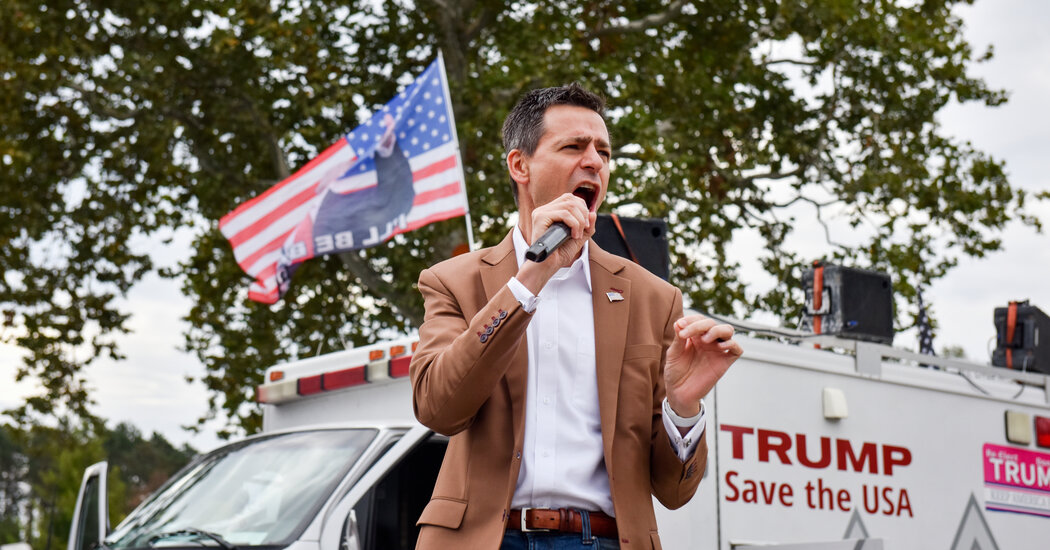
Ryan Kelley, a Republican running for governor in Michigan who was at the Capitol during the Jan. 6 attack, was arrested at his home in Allendale, Mich., on Thursday morning, according to Mara R. Schneider, a special agent with the F.B.I.
Mr. Kelley is the first person running for election in a major state or federal race to be charged in connection with the attack. According to a criminal complaint, Mr. Kelley was charged with committing violence against a person or property on restricted grounds, damaging federal property, disorderly conduct and entering a restricted building or grounds without permission. All four charges are misdemeanors, according to Bill Miller, a spokesman for the United States attorney’s office in the District of Columbia.
An F.B.I. agent described Mr. Kelley’s actions in a filing to the court, saying at one point that Mr. Kelley appeared to use his phone “to film the crowd assaulting and pushing past U.S. Capitol Police officers.” The filing also said that Mr. Kelley used “his hands to support another rioter” who was pulling down a metal barricade, and that he gestured “to the crowd, consistently indicating” that it should continue moving toward the entrance to the Capitol.
Mr. Kelley was able to be identified, in part, because what he wore on Jan. 6 was similar to the outfit he wore at the American Patriot Council “Judgement Day” rally in Lansing, Mich., in May 2020, according to the filing.
Efforts to reach Mr. Kelley and his campaign were unsuccessful. The mailbox for the telephone number listed for the campaign was full and could not accept messages.
Read More on the Jan. 6 House Committee Hearings
A man who answered the telephone listed for the campaign treasurer said, “No comment, thank you” when reached by a reporter.
On Wednesday afternoon, a message was posted on a Facebook page for Mr. Kelley’s campaign that said “Political Prisoner” — echoing how many on the right have referred to those taken into custody in connection with the Jan. 6 attack.
Mr. Kelley was released after making a brief appearance alongside his lawyer in a federal courtroom in Grand Rapids, Mich. He was not required to post bail, Mr. Miller confirmed. His next scheduled court appearance will be a virtual hearing on June 16.
After exiting the courthouse, he thanked the well-wishers who had gathered to greet him. “You guys are awesome,” he said.
He was arrested on the same day that the House committee investigating the attack was set to open a landmark series of public hearings.
One of Mr. Kelley’s Republican rivals in the primary, Kevin Rinke, a businessman, wrote on Twitter: “My hope is that the F.B.I. is acting appropriately, because the timing here raises serious questions.”
Another Republican opponent, Garrett Soldano, a chiropractor, used the arrest to attack the F.B.I., writing on Twitter that it had become “an arm of the Democrat Party.”
Mr. Kelley’s arrest is the latest disruption in the Republican primary for governor, which is set for Aug. 2. Two of the leading candidates in the race — James Craig, a former Detroit police chief, and Perry Johnson, a wealthy businessman — were dropped from the ballot because of forged signatures on their nominating petitions. Both men recently lost legal challenges to be reinstated on the ballot. Mr. Craig and Mr. Johnson are among five Republican candidates in the race who were declared ineligible.
Mr. Kelley is among the remaining five candidates vying to challenge Gov. Gretchen Whitmer, a Democrat, in the general election this fall. Mr. Kelley has raised a fraction of the amount of money as some of the other candidates in the race.
Mr. Kelley, a real estate broker in a suburb of Grand Rapids, was the lead organizer of an armed protest against pandemic lockdown measures at the Michigan Statehouse in April 2020. In June that year, he called together about 50 militiamen to square off against a few dozen Black Lives Matter protesters over a statue of a Confederate soldier in his town.
And after the 2020 presidential election, Mr. Kelley and militia members showed up for a rowdy protest outside a ballot-counting center in the state.
“Becoming too closely aligned with militias — is that a bad thing?” he said in an earlier interview.
Alan Feuer, David D. Kirkpatrick and Mike McIntire contributed reporting.




